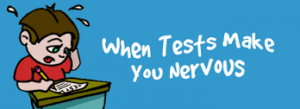Before an important exam, interview, or performance, you probably have experienced butterflies. Butterflies are normal…and they are good! Your body is preparing itself for an important situation.
Physical Responses to Stress
Symptoms that may arise from stress physically include:
- Dry mouth
- Rapid breathing
- Increased heart rate
- Butterflies – digestion shuts down so energy can be redirected to the brain and muscles. There is less blood flow to the stomach creating a sensation of butterflies.
These responses are the body’s way of preparing itself for the upcoming event. All of these responses are good and necessary for top performance. They will help you operate at the highest level.
Mental Responses to Stress
Some more symptoms that may arise from stress are mental and can include:
- Negative thoughts
- Worry excessively
- Trouble concentrating and distracted easily
- Trouble recalling what you studied
- Unable to think effectively on the test/assignment
Interpretation of Nerves
Stress (arousal) and anxiety are commonly used interchangeably, but they shouldn’t be. When the physiological responses to a stressor are interpreted as negative, cognitive anxiety occurs. However, stress doesn’t have to produce anxiety. Our interpretation of our nerves is the most important! You can benefit from the physiological responses to stress without cognitive anxiety. Even the world’s top performers experience nerves before performances. It is not something we should attempt to decrease – it is something we should learn to view as positive and necessary to succeed.
- Embrace your nerves – welcome. Understand they are there to help you perform better.
- Practice under pressure. Place yourself in situations where you must perform under stress. Start with less pressure and then ad stressors as you practice. Assess how the stress can benefit you and learn to enjoy the pressure.
Ultimately, the negative mental responses will decrease through embracing your nerves and becoming less stressed.
Tips for Overcoming Test Anxiety (Nieves, 2015)
- Be aware of your negative thoughts and challenge them with logic
- Relax your muscles and breathe
- Organize yourself both mentally and physically

- Get enough rest the night before an exam
- Sit by yourself and try not tot talk to anyone before the test
- Approach your exam with confidence
- Make sure to eat something – your brain needs fuel and power!
Tips for Overcoming test Anxiety DURING the test (Nieves, 2015)
- Read directions carefully
- Manage your time wisely
- Change positions to help you relax
- Skip a question if you don’t know it and leave it blank for later
- Don’t panic if others finish before you
- If time is running out- focus on the questions you know well
Quiz: Test Your Anxiety
Does your test anxiety hinder you? Take the brief questionnaire Westside Test Anxiety Scale designed to identify students with anxiety impairments.
Helpful Links
- Five Finger Relaxation Technique – University of Chicago
- Relaxation Exercises – University of Arizona
- Letting Go of Test Anxiety – Cornell University
- Understanding Academic Anxiety – Cornell University
Articles on Overcoming Test Anxiety
- Test Anxiety: Why It Is Increasing and 3 Ways to Curb It
- Overcoming College Test Anxiety
- How to Beat Test Anxiety in College
Overcoming Test Anxiety Videos
https://www.youtube.com/watch?v=lRouPProIlo

